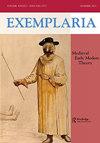Matter and Meaning: Early English New Materialisms
IF 0.3
4区 历史学
0 MEDIEVAL & RENAISSANCE STUDIES
引用次数: 0
Abstract
New materialism is often understood as a modern theoretical solution to a modern ontological problem (that is, it critiques the forms of violence against human and nonhuman beings that the Enlightenment birth of “humanity” and “humanism” engendered). This cluster’s introductory article argues that the Anglo-European Middle Ages, rather than being historically absolved from the effects of Western Eurocolonialism and Enlightenment hierarchies, are rather a particularly strange and thorny forerunner to them. Through an examination of the Polychronicon’s treatment of the Fall, an event closely aligned with the transformation of matter, we show how specific aspects of new materialist critique, namely, liveliness, affective effects, and animate language, are anticipated in and central to early English conceptions of the scala naturae. We compare the approach in Higden’s Polychronicon to some examples of agential matter in non-Western cultural spaces prior to Eurocolonialism; these non-Western accounts help us to understand the limits of a medieval new materialism that centers European, and specifically English, voices, cautioning us against rethinking the history of new materialism without incorporating global perspectives.物质与意义:早期英国新唯物主义
新唯物主义通常被理解为现代本体论问题的现代理论解决方案(也就是说,它批判了启蒙运动诞生的“人性”和“人文主义”所产生的针对人类和非人类的暴力形式)。本丛书的介绍性文章认为,盎格鲁-欧洲的中世纪,与其说是历史上免除了西欧殖民主义和启蒙运动等级制度的影响,倒不如说是一个特别奇怪和棘手的先驱。通过对《多年表》(Polychronicon)对堕落(与物质转化密切相关的事件)的处理的考察,我们展示了新唯物主义批判的具体方面,即活力、情感效果和动画语言,是如何在早期英语自然尺度概念中被预测和核心的。我们将希格登的《多年表》中的方法与欧洲殖民主义之前非西方文化空间中的代理物质的一些例子进行比较;这些非西方的叙述有助于我们理解中世纪新唯物主义的局限性,这种新唯物主义以欧洲人,特别是英国人的声音为中心,提醒我们不要在没有纳入全球视野的情况下重新思考新唯物主义的历史。
本文章由计算机程序翻译,如有差异,请以英文原文为准。
求助全文
约1分钟内获得全文
求助全文
来源期刊

Exemplaria-Medieval Early Modern Theory
MEDIEVAL & RENAISSANCE STUDIES-
CiteScore
0.40
自引率
0.00%
发文量
8
期刊介绍:
The first issue of Exemplaria, with an article by Jacques Le Goff, was published in 1989. Since then the journal has established itself as one of the most consistently interesting and challenging periodicals devoted to Medieval and Renaissance studies. Providing a forum for different terminologies and different approaches, it has included symposia and special issues on teaching Chaucer, women, history and literature, rhetoric, medieval noise, and Jewish medieval studies and literary theory. The Times Literary Supplement recently included a review of Exemplaria and said that "it breaks into new territory, while never compromising on scholarly quality".
 求助内容:
求助内容: 应助结果提醒方式:
应助结果提醒方式:


